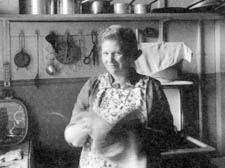|
|
 |
| |

‘Mother in her kitchen in Fife, 1959’: from Ian Jack’s latest book |
Ah! Bananas and
tinned spaghetti
Ian Jack offers up a collection of memoirs and commentary harvested over a lifetime in our rapidly changing island nation, writes Dan Carrier
The Country Formerly Known As Great Britain. By Ian Jack. Jonathan Cape £18.99
THE British Film Institute has in its archives around one billion feet of film. It includes books, documents, letters, posters and stills, and is easily the largest collection of its kind in the world.
Journalist Ian Jack, former editor of the literary quarterly Granta and co-founder of the Independent On Sunday, wished to find a print of a 1942 film his brother had seen with his father, The Arabian Nights. The BFI drew a blank, but having been invited to look around their archives, Jack took them up on the offer.
His musings in his latest book – The Country Formerly Known as Great Britain – is on this behind-the-scenes trip round a warehouse in Hertfordshire and defines why he has published a series of his favourite essays written over the past 20 years.
“The most valuable work of the archive is to restore deteriorating film and transfer the images to newer stock,” he writes.
“Always and everywhere, this unequal struggle to preserve and remember.”
So while our films slowly disintegrate and technicians work flat out to preserve celluloid memories, Jack, who lives in Islington, has used his own archive to consider the things that once defined our country and have all but disappeared from the days of his youth and in are danger of slipping from our collective memory.
Born at the tail-end of the Second World War, he remembers Britain as an industrial nation. Yet the essays, which range from an investigation into the root causes of the Hatfield rail crash to a biography of Katherine Ferrier, a global singing sensation from the back streets of Blackburn, are not pieces of warm beer-fuelled nostalgia. Instead it is a memory game, where the tiny details of Britain in the 20th century are catalogued.
“We were still the workshop of the world when I was a child,” he says.
He recalls looking at maps in geography lessons with legends denoting the mines dotted throughout the North and Wales, fish along the east coast and up to Aberdeen, and steel mills
in swathes through northern towns.
“All of this has pretty much gone,’’ he states. “I do not say, oh, I wish we could be back like that again. Most people live more fulfilled lives than they did in 1955. That’s undoubtedly true if you are, for example, a woman, or gay, or black. Life is immeasurably richer.”
Yet he does lay out the huge changes our economy has undergone and the negative effects this has had for many.
“Since the 50s and 60s we have ceased to be a manufacturing country,” he says.
“We have put all our eggs in the basket of financial capitalism and the service industries. That is to be lamented – we have lost our technical skills.”
He thinks his parents’ generation was riddled with snobbery over industry and that helped hasten its demise.
“If you worked with your hands you were always looked down on,” he says.
“My dad said to me: do not get a job where you have to get your hands dirty. Being an office clerk was seen as a more worthwhile job to do than being a joiner. It is a mysterious thing.”
The book’s eyes scan far and wide. We are offered a piece about the British diet. He says: “...the great change in British eating habits is often put down to Elizabeth David. I wonder. National Service abroad, cheap foreign holidays, higher wages, immigrants from India, China and Cyprus – these would seem larger causes.”
He then goes on to list, with an unerring accuracy, his first encounters with foodstuffs. The change in goods in the Jack family larder is seen as typical. It reads: “Bananas – ‘in a street near the festival of Britain in 1951’. Tin of baked beans that also included sausages – ‘Under a bridge and sheltering from the rain near Hadrian’s Wall, 1956’. Tinned spaghetti – ‘on toast, for tea, 1957 – my Mum said ‘you’ll like it – it’s just like baked beans’.”
Such an age may be gone forever, but Jack’s archiving of his memories means it will not be forgotten.
|
 |
|
|
 |
 |
|
 |
|


